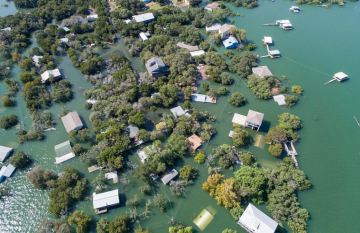Climate change poses one of the greatest challenges to the continued prosperity of businesses, communities, and ecosystems around the world. For Antea Group, our partners, and more than 97% of the world’s publishing scientists, this is an indisputable fact—and a challenge that requires collective action.
In late April, under the helm of the Trump Administration, the U.S. Environmental Protection Agency announced its website would be undergoing changes, according to The Washington Post. Some of those changes included the removal of detailed climate change data and scientific information from several agency sites.
We believe access to data, information, and resources on the reality of climate change is essential to tackling the root causes and creating a sustainable future. Here we share facts, statistics, and resources from our own data and other credible agencies. This is a living document that we’ll continue to update with new resources and research.
What is Climate Change?
Our planet’s climate has constantly been changing over geological time. However, over the past 50 years, global warming is occurring at a much more rapid pace than ever seen before. Scientists believe that this fluctuation in temperature is human-induced; primarily through industrial and agricultural activity like fossil fuel use and deforestation. Gases including carbon dioxide, methane, and nitrous oxide are being emitted in such large amounts that our planet can’t absorb them naturally. So instead, the gases get trapped in the atmosphere, creating a greenhouse effect which causes a rise in temperature and has serious implications for the stability of life as we know it. Even a change of 1–2 degrees F can dangerously affect the delicate balance of ecosystems, significantly raise sea levels, and intensify weather-related risks like storms, droughts, and floods.
What Are Businesses Doing to Reduce Their Impact?
Companies worldwide are now racing to cut their carbon emissions. The first step in reducing emissions is to accurately track them -- because they can’t change what they can’t measure. From there, companies can begin setting emission reduction targets and integrating climate action plans into their business strategies, such as energy reduction programs, increasingly green supply chains, carbon offsetting, and even work-from-home policies that cut down on employee energy costs. Some of the most forward-thinking companies are making investments in renewable energy and other zero-emission technology as mentioned in this blog published by the Earth Institute. Lastly, there are companies, like the members of the Beverage Industry Environmental Roundtable, that see climate change as a universal threat and are collaborating across competitive lines in order to find solutions to their shared challenges.
What Can I Do To Make a Difference?
While our individual steps seem small compared to industry leaps, individuals can also take action to lessen their climate impacts. One of the most common improvements is to become more energy efficient in your home – buying energy efficient appliances, making sure your home is well insulated, and installing energy efficient windows can help decrease energy use. You also have choices when it comes to climate-friendly transport – there are many options including electric vehicles, bikes, carpool/rideshare, and public transportation to get you around town. Diet is another area where small tweaks can add up to meaningful action – cutting back on the amount of red and processed meats you consume can help reduce animal-based food production, a significant contributor to greenhouse gas emissions. Lastly, the biggest way to make a difference in combating climate change is to get informed and get involved – become climate literate and make informed choices when voting politicians and policy-makers into power.
One way to become more informed is by checking out the following resources…
Global Climate Change Resources
1. World Business Council for Sustainable Development
The World Business Council for Sustainable Development (WBCSD) is a global, CEO-led organization of more than 200 leading businesses that are working together to accelerate the transition to a sustainable world. On its website, you’ll find actionable insights, case studies, and other resources for driving sustainability in your business.
Website: http://www.wbcsd.org/
2. World Resources Institute
The World Resources Institute (WRI) is a global research organization that turns big ideas into action at the nexus of environment, economic opportunity and human well-being. WRI is currently working on six critical goals that the world must achieve this decade in order to secure a sustainable future: climate, energy, food, forests, water, and cities.
Website: http://www.wri.org/our-work/topics/climate
3. National Aeronautics and Space Administration
NASA’s Global Climate Change website hosts an extensive collection of global warming resources for media, educators, and public speakers. The website also provides real-time information on Earth’s vital signs including current carbon dioxide, global temperature, arctic ice and sea levels.
Website: https://climate.nasa.gov/
4. The Nature Conservancy
The Nature Conservancy (TNC) is the leading conservation organization working around the world to protect ecologically important lands and waters for nature and people. TNC addresses threats to conservation involving climate change, access to clean water, ocean health, and everything in between.
Website: https://www.nature.org/
5. Beverage Industry Environmental Roundtable
The Beverage Industry Environmental Roundtable (BIER) is a technical coalition of leading global beverage companies working together to advance environmental sustainability within the beverage sector. BIER members monitor climate change policy initiatives and work to ensure policy compliance through common guidance for calculating, tracking and reporting carbon impacts within the beverage sector.
Website: http://www.bieroundtable.com/energy--climate
Learn more about how Antea Group helps businesses understand their climate risks and align strategies for long-term resiliency and competitive advantage.
Want more news and insights like this?
Sign up for our monthly e-newsletter, The New Leaf. Our goal is to keep you updated, educated and even a bit entertained as it relates to all things EHS and sustainability.
Get e-NewsletterHave any questions?
Contact us to discuss your environment, health, safety and sustainability needs today.




